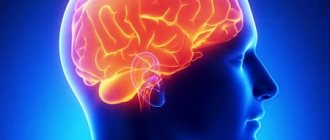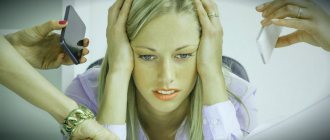| Depression | How to cure |
Find out more
Depression is a common mental disorder that causes people to feel depressed for long periods of time (sometimes a year or more), lose interest and pleasure, feel guilty, experience low self-esteem, sleep or appetite problems, lack of energy and difficulty concentrating.
It is different from simple sadness. Every person at one time or another in life feels unhappy due to a specific reason. With deep depression, strong emotions of anxiety, hopelessness, helplessness and negativity do not go away, resulting in a period of crisis.
This can happen to anyone. Many successful and famous people of all ages have encountered the condition. It is believed that the disorder occurs more often in women than in men.
For half of people, depression occurs only once; for others it happens repeatedly. The length of the period required for treatment and recovery ranges from 6 months to a year or more. What to do to overcome a permanent psychological disorder, how to cope with it is not always immediately clear.
The condition greatly ruins the lives of those who suffer from it and their families, friends, and colleagues. The problem is that it is difficult to determine the onset of the disease, its signs that you are depressed, and understand how to get rid of it.
Quiz of four signs and symptoms of depression from a list
- Fatigue, apathy and loss of strength.
- Persistent sadness.
- Loss of self-esteem and self-confidence.
- Difficulty concentrating.
- Things that are usually pleasant and interesting do not bring pleasure.
- Constant anxiety.
- Reluctance to see other people, even close friends.
- Feelings of helplessness and hopelessness.
- Trouble sleeping - falling asleep or waking up much earlier than usual.
- Very strong feeling of guilt, uselessness.
- Difficulty studying or working.
- Loss of appetite.
- Decreased libido and/or sexual problems.
- Physical pain.
- Irritability.
- Thoughts about suicide and death, self-harm.
If you have 4 or more of these symptoms for most of the day every day for more than two weeks, seek help from your doctor. This is a positive test result for depression. We need to fight, don’t delay treatment. The faster you get rid of it, the shorter the period of development of the crisis and its consequences. Speaking about treatment, it should be noted that therapy does not always involve the use of pills.
Don't judge yourself
1. Stop judging your feelings.
This is the main thing. Blaming and berating yourself for them is ineffective and wrong. It's normal to feel lonely without a serious and meaningful relationship. 2. Realize that your problem is not unique. Today's mobile society is constantly on the move, making it difficult to establish and maintain relationships. The very acceptance that loneliness is part of the human condition will help you find the energy to overcome it.
3. Remember that being lonely is not always to blame for your communication skills. Even if you are a great communicator, sometimes the thought of crawling out of your hole to meet people can be unbearable. Loneliness leads to depression and the desire to isolate.
4. Analyze your childhood. The loneliness we experienced in school or kindergarten is closely related to what we experience in adulthood and how we relate to it.
We may feel unwanted because we received little love as children. Sometimes the problem is aggravated by discrimination and negativity from other people due to some physical or psychological characteristics.
Loneliness often begins with fighting for friends at school, ridicule, or simply having no one to chat with at lunch or play on the playground. Even differences in interests - for example, everyone liked video games, and you liked football - also lead to separation from the group. Or maybe as a child you had one and only best friend who moved away, or you had a fight with him.
There is no one true way to quickly get rid of loneliness. But these general rules work. And the most important thing is to accept yourself and your feelings.
Causes - what causes depression
It begins suddenly as a result of physical illness, worries about unemployment, divorce, loss, family problems or other events, negative changes.
Examples of chronic illnesses associated with depression include heart disease, back pain, and cancer. It can also result from damage to the pituitary gland (a treatable condition), which occurs when a head injury occurs.
In some cases the reason is not clear. However, determining the likely underlying cause is an important initial step in treatment and will influence how quickly you can recover from the crisis and begin to feel normal.
Forms of depression and their manifestations:
Lightweight
The condition is characterized as moderate. It has limited negative impact on daily life. For example, difficulties concentrating at work or having to motivate yourself to do something that you usually like to do anyway.
Classic depression
Signs: loss of appetite, apathy, difficulty sleeping and other daily activities. Often there is only one episode, but more often there are several of them in life. If a person is so unwell that they are at risk of harming themselves, this leads to hospitalization.
Bipolar disorder
Mood swings in bipolar disorder from a high of feeling elated to a low of despair, lethargy and suicidal thoughts. Very serious symptoms are not uncommon. A person’s inner world is filled with feelings that he cannot cope with, and he does what seems strange and illogical.
Postpartum depression in women
Many new mothers experience it a few days after giving birth. The feeling of anxiety and uncertainty is very upsetting, but in most cases it only lasts for a couple of weeks. Postpartum depression is more intense, lasts longer, and requires the help of a medical professional to get out of it. The disorder causes young mothers to feel completely overwhelmed and causes inadequacy. Coping with the condition is not easy. Sleep problems, panic attacks and intense fear of death occur.
Negative feelings towards your child also arise. This happens to every tenth mother and begins in the second or third week after birth.
Seasonal affective disorder
Winter and autumn depression is associated with the beginning of the season, during a period when there is not enough daylight. This stress causes anxiety, worsens mood and causes sleep problems, which can be difficult to overcome.
Useful sport
Any type of fitness is a good solution for those who do not know how to cope with loneliness and depression. This is a great time to plan any physical activity, be it jumping rope in the morning, to the delight of the neighbors, or hiking to Hoverla. If a person doesn’t like sports, it means he just hasn’t found his option yet. It's time to start actively searching for a new hobby. This could be skiing, volleyball, swimming, tennis, jogging, oriental dancing, chess.
A pleasant bonus will be gaining a toned figure, a broad outlook and expanding your circle of acquaintances. In addition, playing sports can improve your psycho-emotional background. After all, physical activity affects the level of substances in the body that regulate mood.
How to cope with persistent depression on your own - advice from a psychologist
What to do when you feel helpless? Soothing music is not always relevant. Take action, do what makes you feel better. Control will have a positive effect. Go to the gym, go for daily walks, practice your interests, what you are good at. Ask a friend to accompany you.
There are many things available that you can do to manage symptoms and a wide range of medical and non-medical treatments available.
Who do you see yourself as?
The way you think about yourself affects your mood and feelings. Feelings of worthlessness or guilt are common. How to deal with this on your own? Banish all negative thoughts about yourself. Try to analyze how realistic they are and how you could change them into something positive. Talk to your doctor about counseling or cognitive therapy.
Social media
If you're feeling down, it's not easy to be social. Loneliness, meanwhile, worsens the condition. Therefore, it is important to keep in touch with friends and family. People around you or a support group will help you get out of deep depression and reduce the feeling of isolation.
Worries about work, money or legal situation
To cope, it is important to make time for the things you want to do and be with friends and family.
If you are extremely stressed with work pressure, talk to your doctor. It will help you reconsider your obligations and solve specific problems that affect it.
If you lose your job, contact your local employment center to help you find it.
Fight, try to keep your job if possible. The moment is important because for people suffering from deep depression, the reason to get up in the morning and go about their business is of particular importance. This helps get rid of the disorder. Connecting with coworkers, staying busy, and the satisfaction of achieving work goals is good for mental health.
Physical activity
Exercise improves your mood because it takes your mind off depression and also stimulates the release of endorphins in the brain. Endorphins are neurotransmitters produced in the pituitary gland of the brain and give a feeling of happiness.
A particularly good therapeutic effect is observed for mild to moderate depression. Ideally, exercise for 50 minutes three to five times a week. To fit activities into your daily routine, this time can be broken up into shorter periods.
Diet
A link between what you eat and depression has been suggested, but lacks conclusive evidence. The condition is thought to be relieved by foods rich in essential fatty acids, which are found in fatty fish (mackerel, salmon, herring, sardines and fresh tuna).
Whether there is a direct connection or not, eating healthy will help you feel better overall and give you more energy. This is especially true if you are exercising.
Quitting alcohol
Alcohol acts as a depressant on the brain. If you drink too much or too often, it becomes extremely stressful and increases your likelihood of falling into long-term depression. If you already suffer from it, drinking alcohol will only make you feel worse. With such a vicious circle, if you do drink, it is better to drink in moderation. You should also avoid taking recreational drugs.
Alarm Management
In addition to persistent depression, half of the patients also experience anxiety. Taking steps to manage your anxiety gives you the mental space to begin fighting depression. Talking about what's bothering you, as well as eating healthy and exercising, promotes control.
In cases of moderate severity, relaxation methods, massage and yoga are effective for treatment. All this allows you to cope with the disorder on your own.
It's okay to be afraid
I'm afraid of gossip
Therefore, let's come to terms with the fact that in any case they will discuss you behind your back. This is also in human nature. Try not to notice such conversations, take care of your peace of mind. And if gossip bothers you, try giving them a new topic to discuss. The personal life of public people is perfect for this.
The wrong tactic is to interfere in the conversation.
Therefore, if you become an unwitting witness to the beginning of such a conversation, do not release your emotions.
And so you took the conversation away from discussing your life and gave a topic for discussion. And most importantly, they maintained their peace of mind and calm.
Of course, such conversations will hurt you, you are a living person. And how painful it is to hear this until the pain of parting has subsided. And you have the right to experience this. The intervention of outsiders, of course, is completely unceremonious. But still control yourself. If you give free rein to your emotions, create a scandal, say nasty things, they will leave you alone for a while.
And if you have already read a lot of negativity about divorced women on the Internet, then immediately close these tabs! You never know who writes anything. And in general, this is written by those who sit in a safe place, hiding behind a mask of anonymity. Most of these people are cowards; they would never say such words to someone's face. And it’s unlikely that you would want to connect your life with him, so don’t pay attention.
Treatments for deep protracted depression
What to do, how to get rid of it? The first step is to see a doctor. The doctor will ask a series of questions about how the condition affects you mentally and physically.
Before going to your appointment, it is helpful to write down what you were experiencing. It is important that you and your doctor agree on how best to manage and treat your type of depression.
It is important to be open with your professional about your symptoms and how they affect you. A recommendation may be given to see a psychiatrist or psychologist.
For mild depression, treatment is not recommended because the risks may outweigh the benefits. It is better to remain vigilantly waiting for the condition to improve.
Talk therapy
There are several types of it. Counseling makes it possible, through a survey, to find out the likely cause of the identified form of depression and develop a strategy to solve the problem.
Cognitive behavioral therapy addresses the way you think and how this can lead to deep depression. It teaches you to identify patterns of behavior and thinking that cause problems and change them.
Psychotherapy is more intensive than counseling, although the terms are used interchangeably. Past experiences influence life now, the connection is revealed if you delve deeply into the beginning of the experience and the key relationships. Interpersonal psychotherapy focuses on how you relate and behave towards others. This helps build better self-esteem and communicate more effectively with others.
To get rid of depression, antidepressants are recommended in many cases, either alone or in combination with talk therapy. Antidepressants help, but inevitably have side effects. Discuss this with your healthcare provider.
About medications
Medication may not always be the first choice, especially if the depression is mild. There are many drugs available. Your doctor will explain which ones he thinks are best for you and why. What will be prescribed depends on the form of the disease and the severity of the case. If you have problems with your medications, consult your doctor.
If one remedy doesn't work, there is a replacement. However, several weeks pass before the drug begins to work. Therefore, enough time must pass to understand whether there is an effect.
- Which doctor should I contact?
It is important to take your medications for as long as recommended by your doctor. Stopping the course early (even if you already feel better) increases the likelihood of relapse. The approximate course duration is 6-9 months and in many cases longer. If you decide to stop treatment, follow your doctor's advice. If you stop taking medications suddenly, there may be negative consequences.
Read other related articles
Transitional age
Teenagers suffer especially acutely from loneliness. Constant companions of adolescence are increased sensitivity, touchiness, and pessimism. There is an opinion that teenagers are more likely than adults to become depressed. But here it is worth adding a few important words to the definition of mental disorder, which was mentioned at the beginning of the article.
It was said above that it is difficult to get rid of depression, and that it is one of the most dangerous modern illnesses. However, it is worth saying that in medical terminology the meaning of the concept is somewhat different from what people put into it in everyday communication. Depression sometimes means just a temporary decline in mood, which can be caused by anything: lack of employment, failures in school or work, minor quarrels with loved ones.
How not to get depressed from loneliness? In order to avoid feelings of abandonment, you must first of all pay attention to loved ones. Oddly enough, the cause of loneliness is often selfishness












